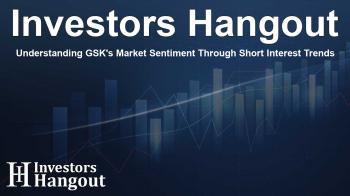Understanding GSK's Market Sentiment Through Short Interest Trends

Analyzing GSK's Short Interest Changes
GSK's recent market activity has shown a notable decrease in its short percent of float, which has fallen by 9.68%. Currently, the company reports approximately 11.29 million shares sold short, making up about 0.56% of all available shares for trading. This fluctuation indicates an average cover time of around 3.54 days for traders holding short positions.
What Does Short Interest Reveal?
Understanding short interest is critical for gauging market sentiment. Short interest represents the quantity of shares sold short without being covered yet. Traders engage in short selling when they believe a stock's price will decrease, aiming to buy back shares at a lower cost to profit from the difference. Conversely, rising share prices result in losses for those shorting the stock.
Why is Monitoring Short Interest Important?
Monitoring short interest levels is essential for investors seeking to understand changes in market dynamics. Increases in short interest may indicate that investors are becoming pessimistic about a company's future, suggesting weaker market sentiment toward the stock. Conversely, a decrease in short interest could signal growing optimism and potentially bullish sentiment.
Recent Trends in GSK's Short Interest
Recent charts show that the percentage of shares sold short for GSK has seen a downward trend since the last reporting period. Although this trend doesn't guarantee a price increase in the immediate future, it suggests a shift in trader behaviors, with fewer shares being shorted overall.
Comparing GSK to Its Competitors
When assessing GSK's short interest, it's beneficial to compare it against its industry peers. This comparative analysis can illustrate how GSK stands relative to similar companies in terms of market sentiment and investor confidence. Industry reports indicate the average short interest among GSK's peers stands at about 3.20%, positioning GSK with lower short interest than most others in its group.
Understanding the Implications of Rising Short Interest
Interestingly, rising short interest levels can sometimes be interpreted as a bullish indicator. For example, if a stock experiences a sudden increase in short interest, it might lead to a short squeeze if the stock price unexpectedly rises, creating a potential profit opportunity for long investors.
The Impact of Market Sentiment on GSK
Market sentiment can significantly influence stock performance. The relationship between short interest and market sentiment is complex. Investors often look at these figures as part of their broader trading strategies, utilizing them along with other market indicators.
Conclusion: Keeping an Eye on GSK
GSK’s short interest metrics offer valuable insights into market sentiment. As the company navigates through evolving market circumstances, these indicators can guide investor strategies and expectations. Understanding the nuances of short selling and reacting to market movements reflects the intelligent trading behaviors that define modern investing.
Frequently Asked Questions
What does a decrease in short interest signify for GSK?
A decrease in short interest generally indicates that traders are becoming more optimistic about the company's stock performance, which could lead to higher prices in the future.
How is short interest calculated?
Short interest is calculated by dividing the number of shares sold short by the total shares outstanding, providing insight into the percentage of shares that are being sold short relative to the total available shares.
Why is short selling risky?
Short selling is risky because it involves selling borrowed shares with the hope that prices will decline. If the stock price rises instead, the investor may face significant financial losses.
How can investors profit from a short squeeze?
Investors can profit from a short squeeze if they hold long positions in a stock that rises suddenly and sharply, forcing short sellers to buy back shares to cover their positions, further driving up the price.
What factors influence market sentiment towards GSK?
Market sentiment may be influenced by economic conditions, company performance, industry trends, regulatory changes, and overall investor confidence in GSK and its market sector.
About The Author
Contact Dominic Sanders privately here. Or send an email with ATTN: Dominic Sanders as the subject to contact@investorshangout.com.
About Investors Hangout
Investors Hangout is a leading online stock forum for financial discussion and learning, offering a wide range of free tools and resources. It draws in traders of all levels, who exchange market knowledge, investigate trading tactics, and keep an eye on industry developments in real time. Featuring financial articles, stock message boards, quotes, charts, company profiles, and live news updates. Through cooperative learning and a wealth of informational resources, it helps users from novices creating their first portfolios to experts honing their techniques. Join Investors Hangout today: https://investorshangout.com/
The content of this article is based on factual, publicly available information and does not represent legal, financial, or investment advice. Investors Hangout does not offer financial advice, and the author is not a licensed financial advisor. Consult a qualified advisor before making any financial or investment decisions based on this article. This article should not be considered advice to purchase, sell, or hold any securities or other investments. If any of the material provided here is inaccurate, please contact us for corrections.

